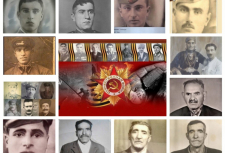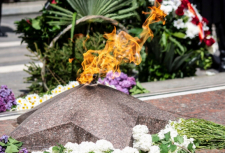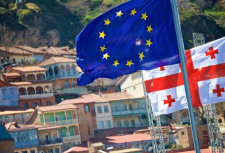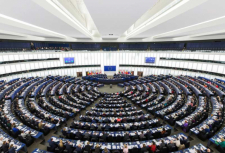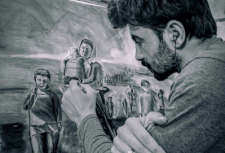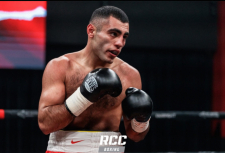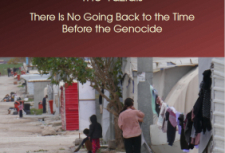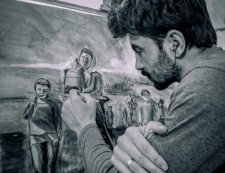Soccer providing vital link between refugees and their new regional community
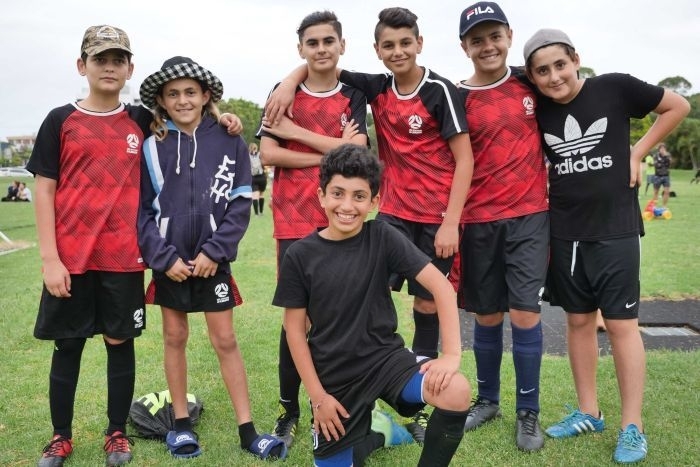
ABC News Australia
The catchcry that soccer is “the world game” rings true at this regional New South Wales field where football has become a way for refugees to find familiarity and friends in their new home. On any given night, 100 people or more can be found kicking a ball around Coffs Harbour’s Maclean Street oval. If it is a Tuesday night in summer, there are up to 1,000 people from all corners of the globe playing and watching the six-a-side competition. Among them is Hameed, who arrived in Australia from Iraq in 2018. “I’m here with my community, in the same team,” he said. “All my friends play; my dad and my mum and my brother, they come and watch.”
Regional migration
Coffs Harbour became a refugee welcome zone in 2008 and since then the town has become home to former refugees from South Sudan, Eritrea, Afghanistan, and the Philippines. There is now also a growing Yazidi and Syrian community and, with the Federal Government’s commitment to encourage new migrants to move to regional areas, the town expects that diversity to grow. Nowhere is that diversity more celebrated than on the soccer field.
“Football is a game for everybody and these people are so passionate about it — it’s their game,” he said. “There are lots of people [who] come down with their picnic rugs, they sit down and watch their kids and stay on and watch other games; it becomes a bit of an event,” Mr Goodworth said. Fadi, who arrived in Australia from Iraq in 2016, loves playing soccer. “You’re just having fun and having fun with your friends. I love it when I just have fun with my friends,” he said. He used to play in Iraq, but Fadi said it was very different playing in Australia.
Working together on and off field
Language and communication are the key challenges for organisers — registrations are all done online. “Kids all want to play and sometimes the adults aren’t able to organise them, the kids’ groups, so the kids do their best to do that,” Mr Goodworth said. Organisers rely on local schools to help kids pull together teams and register. Coffs Harbour High School helped one team of girls from a range of cultural backgrounds to form a team together. Mr Goodworth said he saw people talking and working together on the field. “It’s just getting together with other people and having a common goal and working together for that goal.”
Challenging negative perceptions
Community educator with the Refugee Council of Australia, Deena Yako, said sport was a useful tool in helping people settle. She said activities like sport helped address negative perceptions that some members of the wider community may have about refugees and people seeking asylum.
“It gives them the belonging feeling where they can actually access a local club and feel like part of that community,” Ms Yako said.
In the process of playing games and working together, Ms Yako said refugees became team members with skills rather than a person only looked upon as a survivor of trauma. “Perceptions are often tackled, questions are answered, [and] conversations are taking place, so we can build a better understanding around our newcomers,” she said.
Senior Lecturer in Leisure Studies at Western Sydney University Arianne Reis agreed that soccer was a positive way of settling refugees. “Having something that is familiar can ease a lot of the stress and tension that they are living through in resettlement,” Dr Reis said.
“The more opportunities we can create for people to enjoy themselves together, the more we are going to create that sense of belonging and connection to the country you are living in.” Dr Reis believed there was a need for further options outside sport and said, while soccer was popular and easy to initiate, it did not attract everyone. “I think we need to be mindful of that. I think we need to create opportunities other than soccer,” she said. “We need to see that happening not only with kids and teenagers but with men and women.”
Tags:
Soccer providing vital link between refugees and their new regional community

ABC News Australia
The catchcry that soccer is “the world game” rings true at this regional New South Wales field where football has become a way for refugees to find familiarity and friends in their new home. On any given night, 100 people or more can be found kicking a ball around Coffs Harbour’s Maclean Street oval. If it is a Tuesday night in summer, there are up to 1,000 people from all corners of the globe playing and watching the six-a-side competition. Among them is Hameed, who arrived in Australia from Iraq in 2018. “I’m here with my community, in the same team,” he said. “All my friends play; my dad and my mum and my brother, they come and watch.”
Regional migration
Coffs Harbour became a refugee welcome zone in 2008 and since then the town has become home to former refugees from South Sudan, Eritrea, Afghanistan, and the Philippines. There is now also a growing Yazidi and Syrian community and, with the Federal Government’s commitment to encourage new migrants to move to regional areas, the town expects that diversity to grow. Nowhere is that diversity more celebrated than on the soccer field.
“Football is a game for everybody and these people are so passionate about it — it’s their game,” he said. “There are lots of people [who] come down with their picnic rugs, they sit down and watch their kids and stay on and watch other games; it becomes a bit of an event,” Mr Goodworth said. Fadi, who arrived in Australia from Iraq in 2016, loves playing soccer. “You’re just having fun and having fun with your friends. I love it when I just have fun with my friends,” he said. He used to play in Iraq, but Fadi said it was very different playing in Australia.
Working together on and off field
Language and communication are the key challenges for organisers — registrations are all done online. “Kids all want to play and sometimes the adults aren’t able to organise them, the kids’ groups, so the kids do their best to do that,” Mr Goodworth said. Organisers rely on local schools to help kids pull together teams and register. Coffs Harbour High School helped one team of girls from a range of cultural backgrounds to form a team together. Mr Goodworth said he saw people talking and working together on the field. “It’s just getting together with other people and having a common goal and working together for that goal.”
Challenging negative perceptions
Community educator with the Refugee Council of Australia, Deena Yako, said sport was a useful tool in helping people settle. She said activities like sport helped address negative perceptions that some members of the wider community may have about refugees and people seeking asylum.
“It gives them the belonging feeling where they can actually access a local club and feel like part of that community,” Ms Yako said.
In the process of playing games and working together, Ms Yako said refugees became team members with skills rather than a person only looked upon as a survivor of trauma. “Perceptions are often tackled, questions are answered, [and] conversations are taking place, so we can build a better understanding around our newcomers,” she said.
Senior Lecturer in Leisure Studies at Western Sydney University Arianne Reis agreed that soccer was a positive way of settling refugees. “Having something that is familiar can ease a lot of the stress and tension that they are living through in resettlement,” Dr Reis said.
“The more opportunities we can create for people to enjoy themselves together, the more we are going to create that sense of belonging and connection to the country you are living in.” Dr Reis believed there was a need for further options outside sport and said, while soccer was popular and easy to initiate, it did not attract everyone. “I think we need to be mindful of that. I think we need to create opportunities other than soccer,” she said. “We need to see that happening not only with kids and teenagers but with men and women.”
Tags:
